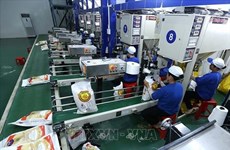Anti-dumping decision not in line with Vietnam-EU ties
A senior Vietnamese trade official has
decried the EU’s extension of anti-dumping duties on leather-capped
shoes from Vietnam, saying it is unsuitable with the growing economic
and trade ties between Vietnam and the EU.
A senior Vietnamese trade official has
decried the EU’s extension of anti-dumping duties on leather-capped
shoes from Vietnam, saying it is unsuitable with the growing economic
and trade ties between Vietnam and the EU.
Deputy Trade Minister Le Danh Vinh gave the comment in a telephone interview with a Vietnam News Agency correspondent immediately after the European Union ministers made final decision on December 22 by voting to extend anti-dumping duties on shoes from Vietnam and China for 15 months .
The decision was made at a time when Vietnam is doing its utmost to create a favourable business environment for foreign investors, including those from Europe, Vinh said.
He stressed that the EU’s decision will cause dual negative impacts on Vietnamese footwear industry because the EU has recently removed Vietnam’s footwear exports from the list of beneficiaries of the Generalised System of Preferences (GSP).
Vinh said EC analysis also showed that European shoemakers, who are plaintiffs in the anti-dumping case against Vietnam, do not suffer any damage from imported products at the moment. The market shares of European producers remained stable during the survey period (since October 2008) compared to 2006.
The deputy minister reckoned that the anti-dumping duty extension would significantly affect European consumers, who will be restricted from choosing products at more reasonable prices. The groundless decision will also affect the legitimate interests of European businesses who are investing in Vietnam , he added.
The EU duty extensions, expected to come into force on Jan. 1, 2010 will apply to middle and high-end leather shoes–the major export staples of Vietnam’s leather and footwear industry that are currently offered at a more competitive price than those from other countries.
The European Commission - the legislative arm of the EU - is currently imposing an anti-dumping tariff rate of 16.5 percent on Chinese and 10 percent on Vietnamese leather shoes./.
Deputy Trade Minister Le Danh Vinh gave the comment in a telephone interview with a Vietnam News Agency correspondent immediately after the European Union ministers made final decision on December 22 by voting to extend anti-dumping duties on shoes from Vietnam and China for 15 months .
The decision was made at a time when Vietnam is doing its utmost to create a favourable business environment for foreign investors, including those from Europe, Vinh said.
He stressed that the EU’s decision will cause dual negative impacts on Vietnamese footwear industry because the EU has recently removed Vietnam’s footwear exports from the list of beneficiaries of the Generalised System of Preferences (GSP).
Vinh said EC analysis also showed that European shoemakers, who are plaintiffs in the anti-dumping case against Vietnam, do not suffer any damage from imported products at the moment. The market shares of European producers remained stable during the survey period (since October 2008) compared to 2006.
The deputy minister reckoned that the anti-dumping duty extension would significantly affect European consumers, who will be restricted from choosing products at more reasonable prices. The groundless decision will also affect the legitimate interests of European businesses who are investing in Vietnam , he added.
The EU duty extensions, expected to come into force on Jan. 1, 2010 will apply to middle and high-end leather shoes–the major export staples of Vietnam’s leather and footwear industry that are currently offered at a more competitive price than those from other countries.
The European Commission - the legislative arm of the EU - is currently imposing an anti-dumping tariff rate of 16.5 percent on Chinese and 10 percent on Vietnamese leather shoes./.












